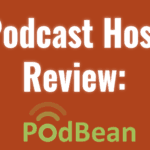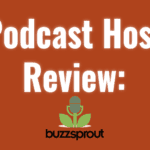5 Practical Ways to Boost Empathy with Podcasts For Listeners Who’ve Had Enough

Far From Being Merely a Soft Skill, Empathy Is a Virtue That Can Boost Your Podcasts’ Bottom Line
Alright. Here’s a little thought experiment for the week ahead.
In your life, where would you rank the quality “empathy” on a scale of 1 – 10? You know the drill. 1 being not important at all, 10 means empathy is the most important trait you possess.
I can hear what you’re thinking as you’re reading.
“James,” you say, “of course I’m going to rank empathy high up on the list. I am a very empathetic person.”
You aren’t alone in answering like that. Most of us believe empathy to be important. But, if you’ve looked around lately, you may have noticed our actions don’t back that up. In fact, Penn State found that, at least politically, we’re all, incapable of mustering any empathy for the other side.
Fret not. While we long for empathy we don’t currently have, you may not need much more guidance than a podcast can provide. A podcast can help claw back your empathetic bona fides. Podcasts, as a medium, can actually make you more empathetic.
The Benefits of Empathy
Too often, empathy gets lambasted as a “soft-skill.” I come from a sales background, and when I was coming up “there’s no honor amongst thieves” was an aphorism thrown around with abandon. I really thought I wasn’t cut out for sales as a result.
That actually wasn’t the case though. I just needed to run a different play to get to the end zone. Empathy, it turns out, leads to more of the lauded “win-win” deals you hear so much about.
It turns out that not every real estate transaction requires a legal budget. At least not if you approach it with the intention that you’ll understand the counterparty and try to add value.
Now, that’s just my own example from real estate sales, those empathy skills cut across any industry where there’s any type of relationship. Don’t think the best podcaster interviewers score high in the old empathy category?
Why not listen to the same guest on Tucker Carlson as you would Inside the Actor’s studio. Who gets more new information from their guest?
Empathetic people are happier, have better relationships, and are better leaders.
So, not only is empathy a cool Aristotelian value, it can boost your bottom line.
Alright, you’re sold on empathy, how can podcasts make you more empathetic?
Download Podcasts Outside Your Own In Group
The first step to solving a problem is admitting we have one right? Well, we have an empathy problem.
On the APA’s podcast, Speaking of Psychology, Dr. Sara Konrath explains that our collective empathy has been declining. At the same time, our narcissistic tendencies have been on the rise. Some of this has to do with our ability to create media bubbles for ourselves. To wall ourselves off within informational tribes.
Apple iTunes | Stitcher | Spotify
Tribes are great for audience building and marketing segmentation. But there are some notable downsides.
Our habitual thoughts become ingrained in our subconscious. We jump to conclusions about what other people are thinking, or what other people are feeling. We presume to know the motivations of others based, not on their experience, but on our own.
Podcasts can help arrest this trend and give empathy more room to breath.
With the privacy your earbuds afford you, exploring, in significant depth, the life and culture of others is entirely possible. Where you may not be able to walk into a closed group, you can stream a podcast. You can gain perspective and understanding from viewpoints you never encountered before.
This can be racial or political, of course. But we can learn so much more about all types of subcultures we may not have known existed. We can learn something about what your alcoholic friend is experiencing. Or to gain more exposure to the plight of our LGBTQ family.
Apple iTunes | Stitcher | Spotify
Listen Actively
When we consume podcasts, we do so for different reasons. To kill time. To escape the world for a while. To catch up on the news during a commute.
We consume a lot of podcast content while we are ostensibly doing something else. While we are driving, making dinner, going for a walk, etc.
But in order to develop our capacity for empathy, we need to practice active listening. We need to make the experience of listening to these “foreign” podcasts one where we devote our full attention. It has to be the primary activity, or we are missing the point of the exercise.
The point isn’t to watch another hour tick off the clock. It’s to embody someone else’s experience. To be fully immersed in another audience.
You should find yourself saying, “Wait, wait, wait. What did they say? Whoa.” with some regularity. It will feel like a challenge.
It shouldn’t be done passively.
Don’t Challenge New Information, Absorb
When working on broadening your empathetic horizons, it’s important not to push back. At least not right away. Not until you fully understand what’s being conveyed.
Humans have a tendency, when interacting with out-groups, to build straw men caricatures of those out-groups. They are easier to argue against. It makes us bristle when we hear new information from that group.
We don’t like information that conflicts with our own epistemic experience. So we reflexively push back against the straw man.
We allow our cognitive distortions to fill informational gaps. That leads to some thinking that is, well, awful.
Life begins to resemble a twitter feed embodied. We react not to an idea but to 280 characters of an idea. We fire off our own slice of half-baked understanding that’s gone in an instant. That’s no way to treat an idea or point of view you sincerely want to understand.
Instead…
Find The Golden Threads
Find common ground. Start with what’s familiar to you and look for commonalities. Take what underpins your themes and apply that to the foreign themes, sentiments, or ideas.
You may find they aren’t that foreign after all.
Now, you don’t have to do anything with those themes. The goal isn’t to change behavior. The goal is to be mindful those connections exist and to shore up those empathetic bonds.
Politics is the obvious, and always timely, example. A show like the New York Times’ The Argument does an earnest job understanding “the other.” It’s cathartic really.
Apple iTunes | Stitcher | Spotify
This will sound trite, but it’s accurate. There are many more experiences and potentials that bind us than there are circumstances that have to divide. It can be hard to recognize that because we spend so much time with the surface divisions.
Our Italian friend, Pareto, makes another appearance here as well.
When we are listening to podcasts with the intent of flexing our empathy muscles, we need a warm up. Remembering that we’re 80% the same serves as that warm up before hitting the 20% intensity workout.
You can’t hit the gym cold. You’ll tear a muscle. Then you’ll have to rehab before you can learn something new. It’s a whole thing…
Evaluate, Incorporate, and Practice
Now that you’ve primed the pump, take those empathy skills out into the real world.
The study of knowledge gives us three basic frameworks for incorporating a new belief, point of view, or piece of information into our lives. Realism, contextualism, and relativism. Each has value.
Once you have worked to run your new podcast rotation through these frameworks, you can start putting the insights to work.
When you have discussions with people in the workplace, at school, or online, you’ll be in a much better position to find nuance and understanding.
We all need that right now and it will pay practical dividends as referenced above.
Conclusion
Podcasts are an incredible learning tool. It’d be hard to argue otherwise. They have the potential to change not only what we know, but how we feel about a given subject.
Podcasting is an intimate form of media. The way a podcast is most often consumed, through earbuds. That intimacy means that you can absorb information from unfamiliar viewpoints and cultures.. With almost nobody knowing and therefore, no downside risk.
The result is powerful. Podcasts allow us to step into the shoes of the other intimately and retain anonymity. That’s a tremendous opportunity to stretch our empathetic capacity.
What are some shows I should be listening to that I haven’t yet? My quarantine queue is always crying out for new ideas. Let me know on Twitter.













2 Comments
Pingback Podcast Spotlight: Songwriter Trysts Podcast | Discover the Best Podcasts | Discover Pods
Pingback Podcast Spotlight: The Third Place Podcast | Discover the Best Podcasts | Discover Pods
Comments are closed.